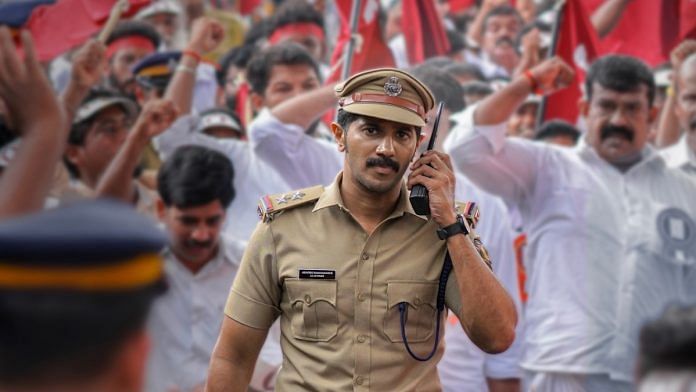Dulquer Salmaan’s new Malayalam film Salute is an ode to the good-old police crime thriller.
Directed by Rosshan Andrrews and written by Bobby and Sanjay, Salute has all the ingredients of a good whodunnit, from a cold case with new suspects to fight scenes and corrupt police officers. Whether it means to or not, the film explores heavy issues like the breach of ethics in the police force and the impact of external pressure on sensationalised cases.
Dulquer Salmaan plays Aravind Karunakaran, a bright police officer who has a crisis of conscience after he — at the behest of his elder brother Ajith, a senior police officer who he idolises — frames an innocent man for a double-murder. After new evidence surfaces, Aravind decides to own up to their unethical behaviour while his brother and policemen colleagues try to stop him. Ultimately, Aravind carries out his own investigation into the double-murder.
The film is produced well by Salmaan’s production house, Wayfarer Films, and Salmaan delivers an excellent performance as a policeman who’s trying to do the right thing. Director Rosshan Andrrews, of Udayananu Tharam (2005) fame, has worked with writers Bobby and Sanjay several times before, which is why the film comes together visually.
However, Wayfarer Films courted controversy by ultimately deciding to go down the OTT route: Salute had an early exclusive release on SonyLIV on 17 March. The Film Exhibitors United Organisation of Kerala has banned Wayfarer Films from screening in theatres, because the production company changed their stance on Salute’s theatre release.
Also read: Loose plot, tight acting: In Amazon Prime’s Jalsa, Shefali Shah outshines Vidya Balan
The story, and the gaps
Blink and you’ll miss Diana Penty’s Malayalam debut. She plays Aravind’s partner Dia in a refreshing take on relationships: The two live together, have no interest in getting married, and completely support each other. It’s in stark contrast to the more traditional marriage Aravind’s brother is in: At one point, Ajith, played by Manoj K Jayan, barks at his wife to pack a suitcase for him in the middle of the night and tells her to do as she’s told when she questions it.
The film is set at an enjoyable pace, carrying the story forward by building suspense. The plot isn’t watertight, but the storytelling makes it work by centring Aravind’s own investigation into the case.
But oddly enough, throughout Salute, Aravind’s character does not fully antagonise his brother. The audience isn’t given enough context into their family dynamic outside their professional conflict — all we know is that Aravind looks up to his elder brother Ajith, even after he realises he is unethical. Most of the other police characters — including Ajith and his cronies — do their best to punish Aravind and his moral superiority. This is what makes the film incongruous, because even though Aravind is portrayed as an upright cop, he is unnaturally forgiving towards other policemen and still has faith in his profession.
Also read: The Kashmir Files tries showing 1990 exodus ‘truth’ but Vivek Agnihotri gives it death blow
Indian cop movies don’t change
The movie seems to be making a strange divorce: Aravind doesn’t hold his brother responsible, he holds “the system” accountable. The tacit understanding is that if the police engage in violence or use underhanded means, it’s only because there’s political pressure to do so.
The blame is laid squarely at the feet of politics. “As long as there are ministers and politics and elections, things are not going to change,” says Ajith, as if absolving the police force of unethical behaviour.
The other issue is that the film subconsciously links violence and brute force with being a policeman. In one scene, Aravind uses extreme violence to stop someone from harassing a woman. Dia shouts at him to stop by reminding him that he’s not in the police force anymore, and could be arrested. The dangerous subtext is that if he was a police officer, he would be justified in using violence.
If Salute is a critique of the police system and the way investigations are conducted, then it’s a nuanced representation of the system’s complacency. But if it’s just meant to be a good-cop-bad-cop story, then it leaves a lot to be desired because the film fails in convincing you that Dulquer Salmaan’s character is a “good cop” — he’s just a cop trying to fix a mistake he helped make.



